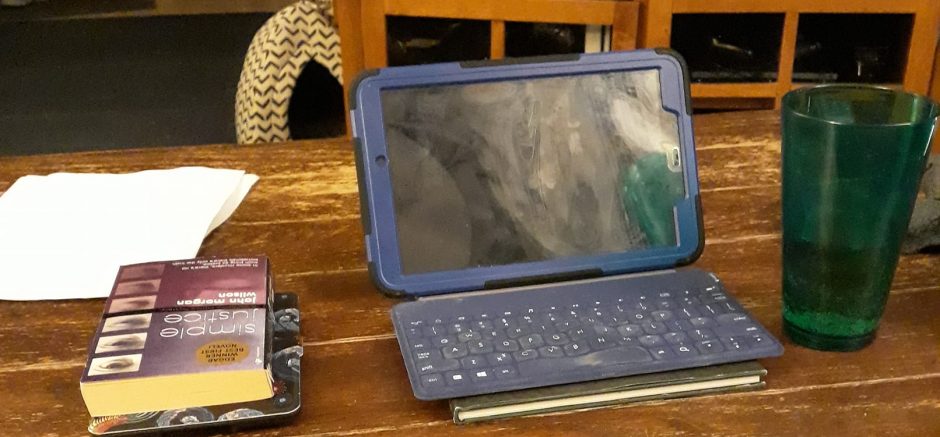He doesn’t know how he got this way. Crazy, that is. Most things, you think about them long enough, you come up with an answer. All he knows for sure is that he got to work this morning in his Chevy pickup, the laundry is done, there are ham sandwiches in his lunch pail, and that next Saturday he gets to see his kids.
The draw die booms at the front of the line and he switches on the conveyor. Panels come, and it’s load, hit the buttons, load, hit the buttons.
It seems noisier than usual this morning. They’ve turned everything up a notch again. Air hisses like angry snakes at his feet, scrap clatters down the chutes, the floor vibrates: squealing, clanging, grinding, scraping, shearing, the hundreds of presses going to war.
He reaches for the buttons and a tremendous explosion brings him off his feet. He starts shaking, can’t help it, and turns off the conveyor. A 40-ton die has just been dropped by a crane twenty feet from him.
Could get squashed like a bug in here, like old Hendricks on the door line, got his head caught in a welder. Said it was suicide…Ha! …something spooked him and he fell in.
Then he sees the foreman charging along the press line. The boss don’t scare this guy any. “Get me the safety man!”
“Turn that conveyor on.” The boss’s eyes are bloodshot from his nightly drunk.
He feels his shoulder twitch. No. Hitting him again might get him fired. Felt good the time he floored him, though. The boss looks up to the ceiling and acts real sad, like maybe he’s got problems, too. “What’s the deal?”
He points to the die. “Get the line going and I’ll call safety.”
He thinks of Granddad’s farm for some reason. When they lived in that coal camp he used to hike back to the home place to see Gramps. If only the old man could be here. He’d know what to do with this place—maybe plow it under and start over.
“Get the conveyor on.” He feels his shoulder twitch again and it scares him. Boss takes him upstairs, he’ll get time off, just get behind in child support.
The foreman shakes his head and walks away. Guess he don’t need trouble either. He turns on his belt and loads the panels, hits the buttons, sinks into the rhythm.
At break he heads up to the locker room with Al. He downs most of the Coke he bought at the vending area. Al grins and fills their cups from his bottle of bourbon. Al was in his division in Korea. Never knew him there, but it’s a sort of kinship—that and the fact they grew up not ten miles from each other in Southern West Virginia.
They sit watching the black smoke curl out of the stack at the powerhouse. The drink goes down easy. “Couple them kids went home already. Double time and all they can think about is getting out of here.”
He shakes his head. “Never been hungry, I guess.” Double time, though? That’s right! Today is Sunday.
Al laughs. “Little brats don’t know what work is. Like to get ‘em out in the fields for a day.”
Al pours himself another one and holds the bottle out. “I’m good,” he says and in a minute they ride the escalator down to the press room. As they split up he thinks about what Al said about working the fields. He never minded that, even the tobacco cutting. Come to think of it, those days sort of shine out from all the rest of his life.
He sets his drink on the greasy die shoe and pictures Granddad, Uncle John, Dad and him and the other kids out there. It was always sweet and damp in the morning. They’d be hot by noon, sweating and hungry, but there would be lunch of beans and taters and cornbread. Good thing, in a way, Korea came along and he got out of there before he went in the mines.
The drink eases the morning along, and the noise can’t get to him; but the building’s vibrating now. He always wonders why it don’t fall down.
He wishes he knew how he got this way. Depressive neurosis, the doctor always calls it. This time he’s going to make it, though. Got the best job anybody’d want. Made good money the last couple of years when he wasn’t sick. He was going to quit, but the doc talked him out of it.
Wishes he was still married. But it don’t do a bit of good to think back all them years to how it was. It’s him being crazy that did it. She and the kids just moved out one day while he was at work. All he ever done was try to make a living.
The doc figured it was from Korea, some sort of delayed reactive neurosis. Guess so, but he is never able to come up with anything real bad that happened there. All he remembers from the last few months of being married is he was real tired and fell asleep in his chair every night.
Well…least he can retire in 12 more years. You work hard, you get what’s coming to you. Don’t know what he’ll do all day, though. Don’t do nothing now when he has a day off.
The lunch whistle blows and he shuts down the conveyor and press. All there is now is this loud hum from all the 440 electric motors winding down. He checks the meter—only eleven hundred more panels and they’re finished. He grabs his lunch pail, buys a Coke, and heads upstairs to the locker room.
He’ll call the kids on the phone when he gets home today—that’s what he’ll do—make sure Tom’s keeping his grades up. Ain’t everybody can afford to send their kids to college. He hopes Tom knows that.
 William Trent Pancoast‘s novels include WILDCAT (2010) and CRASHING (1983). His short stories, essays, and editorials have appeared in Night Train, The Righteyeddeer, The Mountain Call, Solidarity, US News & World Report, and numerous labor publications.Pancoast recently retired from the auto industry after thirty years as a die maker and union newspaper editor. Born in 1949, the author lives in Ontario, Ohio. (more information available at williamtrentpancoast.com)
William Trent Pancoast‘s novels include WILDCAT (2010) and CRASHING (1983). His short stories, essays, and editorials have appeared in Night Train, The Righteyeddeer, The Mountain Call, Solidarity, US News & World Report, and numerous labor publications.Pancoast recently retired from the auto industry after thirty years as a die maker and union newspaper editor. Born in 1949, the author lives in Ontario, Ohio. (more information available at williamtrentpancoast.com)





